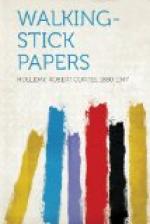How green, on such a day, are the greens; the distant purples how purple! The stone walls are cool. The great canvas of the sky has been but newly brushed in, as if by some modern landscape painter (the tube colours seem yet hardly dry); the technique, the brush-marks, show in the unutterably soft, warm-white clouds; or, like a puff of beaten-egg white, wells above that orchard hill. Higher up, thinly touched across the blue, a great sweep of downy, swan breast-breast feathers spreads. But not one canvas is this sky; ceaselessly it changes with the minutes. To observe is to walk through an endless gallery of countless pictures. It is alone a life-study. Now the wind has blown it clear as blue limpidness; now scattered flakes appear; now it is deep blue; now pale; now it tinges darkly; now it is a layer of cream. Again, it breaks into shapes—decorative shapes, odd shapes, lovely shapes, shapes always fresh. Its innovations are unflagging, inexhaustable. Always art, its genius is infinite.
One must go a journey to discover how vast the sky really is, and the world. To mount, bending forward, up by a long, tree-walled ascent from some valley, and come upon this spectacular sight—the fair globe that man inhabits lying away before one like a gigantic physical map, a map in relief, cunningly painted in the colours of nature, laid off by woods and orchards and roads and stone walls into many decorative shapes until it melts into purple, and fainter and fainter and still fainter purple Japanese hills. The sight is some of the noble quarry, the game; this is the anise-seed bag of him that goes a journey. Some glimmering of the nobility of the plan of which he is a fell, erring speck comes over one as he looks. This is the religious side of going a journey.
It is best to go a journey on a road that you do not know; on a road that lures you on to peep over the crest of yonder hill, that ever flees before you in a game of hide-and-seek, disappearing behind great, jutting rocks and turns and trees, to leap out again at your approach and laughingly, elusively, continually slip before you; a road that winds anon where some roaring brook pours near by; a road that may deceive you and trick you into miles out of your way.
A high breeze rushes through the trees and fans the traveller’s opened pores. With a sudden, startling whir, mounting with their hearts, a bird flushes from the tangled growth at the roadside.
The worst roads for walking are such as are commonly called the best; that is, macadam. A macadam pavement is a piece of masonry, wholly without elasticity, built for vehicles to roll over. To go a journey without a walking-stick much would be lost; indeed it would be folly. A stick is the fly-wheel of the engine. Something is needed to whack things with, little stones, wormy apples, and so forth, in the road. It can be changed from one hand to the other, which is a great help. Then if one slips a trifle on a down-grade turn it is a lengthened arm thrown out to steady one. It is the pilgrim’s staff. On the up-grades it assists climbing. It is a weapon of defence if such should ever be needed. It is a badge of dignity, a dress sword. It is the sceptre of walking.




